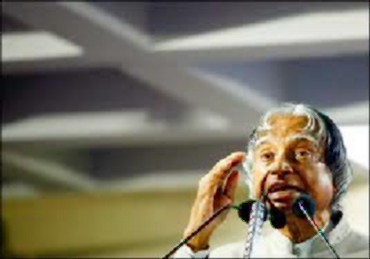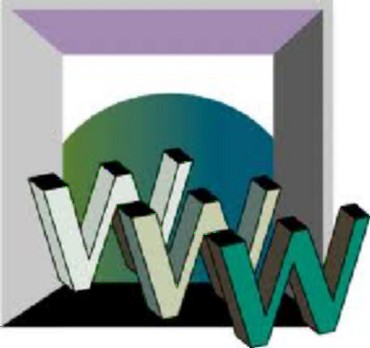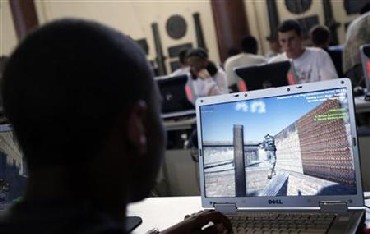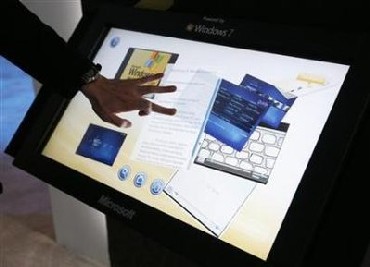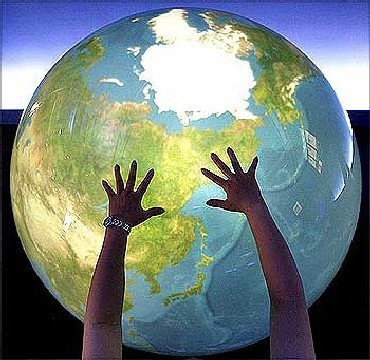 | « Back to article | Print this article |
Language barriers will now be a thing of the past
Former President APJ Abdul Kalam on Wednesday launched the Machine translation (MT) systems, also called content multiplier tools, developed with funding from TDIL (Technology Development for Indian Languages) programme at the 20th International World Wide Web conference in Hyderabad.
Based on the Computational Paninian grammar (CPG), which works very well for free word-order languages, Indian languages in particular, the tools are available in three modules - Sampark (Indian to Indian), AnglaMT (English to Bengali, Malayalam, Punjabi and Urdu) and Anvadaksh (English to Hindi, Bengali, Marathi, Oriya, Urdu and Tamil).
"India has more than 122 languages of which 22 are official. More than a billion people all over the world speak either Hindi, Bengali, Telugu, Marathi, Tamil or Urdu. With the availability of e-content and development of language technology, it is now possible to overcome the language barrier," Rajeev Sangal, director of IIIT-Hyderabad (one of the 17 institutions that participated in the development of the tools), told mediapersons.
Click NEXT to read more...
Language barriers will now be a thing of the past
Sangal said three consortia comprising 17 academic and research institutions were involved in building 26 different pairs of languages. Right now, 12 pairs are available and the plan is to release more pairs every three-four months, he added.
"An amount of Rs 13 crore (Rs 130 million) went into the whole exercise and about 200 students were directly involved in the development of these tools. An additional 200 students worked on the project as a thesis and their algorithms were embedded into the systems directly," Sangal said.
The MT quality, Sangal said, was better in case of translation between Indian languages because they were similar in many ways, both in grammar and vocabulary.
Translation between English and Indian languages is harder and hence the output quality is likely to be inferior.
Click NEXT to read more...
Language barriers will now be a thing of the past
"We are now asking users to try using the tool as an experiment. Our only focus now is on improving quality," he said.
Stating that the MT technology is currently freely accessible, Sangal said the MT initiative would be monetised when special needs for further research arises.
"Company-based efforts can also be initiated. We are already working with translation houses and publishers," he said, adding students at the IIT-Hyderabad were working on a text-to-speech system, and at some point these two technologies (text-to-speech and MT systems) will be combined together.
Click NEXT to read more...
Language barriers will now be a thing of the past
Furher, with the world wide web (www) emerging as an agent of societal transformation, the future of the web is going to shift from connecting the corporate to connecting the individual in the rural societies, thanks to new mobile technologies, said former president Kalam.
"The Web community should focus on developing technologies that can provide useful information to the masses on the mobile platform using the latest 3G and 4G technologies. The world community will look for how a mobile device can provide integrated solutions of 3G or 4G applications to people in their mother tongue," he added.
The emergence of 3G and 4G technologies provide the perfect opportunity to link up demand for bandwidth coming from villagers and the supply coming from 3G and 4G technologists.
Click NEXT to read more...
Language barriers will now be a thing of the past
"4G offers a vast range of bandwidth and societal application, particularly involving farmers and villagers who are less empowered. So, there is a need for more bandwidth. This means that a fisherman will be in a position to get advance information about the sea conditions and locations of abundant fish. For a farmer, this means access to prices of agriculture produce at various markets in the country and also their demand," he said.
According to Kalam, the web has to transform to meet such challenges and over time, the web will offer access without any barriers of language, caste, creed or location.
Kalam also called for making the mobile a personal authentication device and stressed on the need to make all money transactions and micro payments through mobile phones highly secured.
